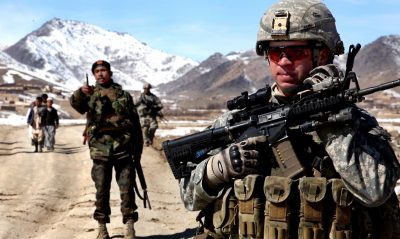Did Russia and China Get the US to Accelerate Its Diplomatic Drawdown in Afghanistan?

Reuters quoted “deep state” sources as reporting that the US will accelerate its diplomatic drawdown in Afghanistan, with this breaking news coming on the same day as its representatives met with their Russian and Chinese counterparts in Moscow to discuss the future of the Taliban peace talks, making it very unlikely that the timing of this possible downscaling is coincidental and adding credence to the theory that it might instead be the result of a backroom deal clinched during Thursday’s summit.
A Quid-Pro-Quo?
Reuters just released an exclusive article quoting “deep state” sources who report that the US Secretary of State will accelerate his country’s diplomatic drawdown in Afghanistan by dramatically moving up the timeline for halving its number of diplomats in the war-torn country. The outlet’s insiders say that the process will start at the end of next month instead of sometime next year like was originally planned, with this news breaking on the same day as the US, Russia, and China met in Moscow to discuss the future of the Taliban peace talks. The author’s piece earlier this week about this event predicted that some backroom deals will be clinched during this event, and while it can only be speculated what this reported move might have been made in exchange for, it nevertheless appears to be the first possible outcome of that summit.
Sour Grapes
Trump’s “deep state” opponents are already taking to the media to portray this decision as an extremely short-sighted one made by an impulsive president who’s internationally inept, a weaponized narrative that also satisfies the strategic soft power objectives of India, which has sour grapes over the US’ Taliban peace talks. Being self-excluded from this process as a result of its refusal to endorse other countries’ pragmatic peacemaking outreaches to the most powerful armed force in Afghanistan, India instead endeavors to either sabotage their plans or at the very least apply some of its “Bollywood magic” to craft the perception that the talks are a failure and disastrous for the interests of all those involved, except of course for its Pakistani rival that it wants the world to believe is manipulating the international community into doing its bidding.
India’s Interests
In actuality, however, it’s India that’s the real manipulator because its RAW intelligence agency is doing all that it can to keep the US in Afghanistan, including through its efforts to provoke a domestic public outcry against Trump’s policies as a means of pressuring him “from below” ahead of the 2020 elections. Peace in Afghanistan doesn’t suit Indian interests because the South Asian state regards the landlocked country as providing it with “strategic depth” vis-a-vis Pakistan and functioning as a sanctuary for RAW-backed Baloch and TTP terrorists to receive training prior to the attacks that they’re ordered by their overseers to carry out as part of the Hybrid War on CPEC. An American withdrawal, or even a large-scale military-diplomatic drawdown, would greatly hinder India’s ability to wage its proxy war against Pakistan.
Simultaneous Signals
That’s exactly what seems to be in the works, however, since this report would represent a huge policy shift in American strategic planning if it’s true, one that might presumably be due to some kind of backroom deal being reached during the latest round of the Moscow peace talks seeing as how the news broke on the exact same day. Provided that there’s some truth to it, then the US would be sending simultaneous signals to the Taliban and Kabul; the armed group should see that Washington is negotiating in good faith and therefore reconsider its reluctance to talk with Kabul, while the “government” should understand that its days are numbered and that it’s better for them to begin immediately making political concessions to the Taliban before it’s too late. Both of these messages, it should be said, would be extremely disturbing for Indian strategists.
“Keep America Great”!
From the looks of it, the US might indeed be planning to “cut and run” from Afghanistan by sometime next year so that Trump can use the withdrawal (whether it be a full one by that time or just a drastic drawdown) as proof that he’s fulfilling his campaign pledge to “Make America Great Again” by saving it billions of dollars every year on its most costly war ever so that voters re-elect him to “Keep America Great”. The US President keenly understands that his Afghan policy might be the key to winning the heated 2020 elections, which might be why he’s clinching whatever pragmatic deals he needs to with all relevant stakeholders in order to obtain the optics of a major foreign policy victory that might guarantee him a victory at next year’s polls.
*
Note to readers: please click the share buttons below. Forward this article to your email lists. Crosspost on your blog site, internet forums. etc.
This article was originally published on Eurasia Future.
Andrew Korybko is an American Moscow-based political analyst specializing in the relationship between the US strategy in Afro-Eurasia, China’s One Belt One Road global vision of New Silk Road connectivity, and Hybrid Warfare. He is a frequent contributor to Global Research.
Featured image is from Strategic Culture Foundation

